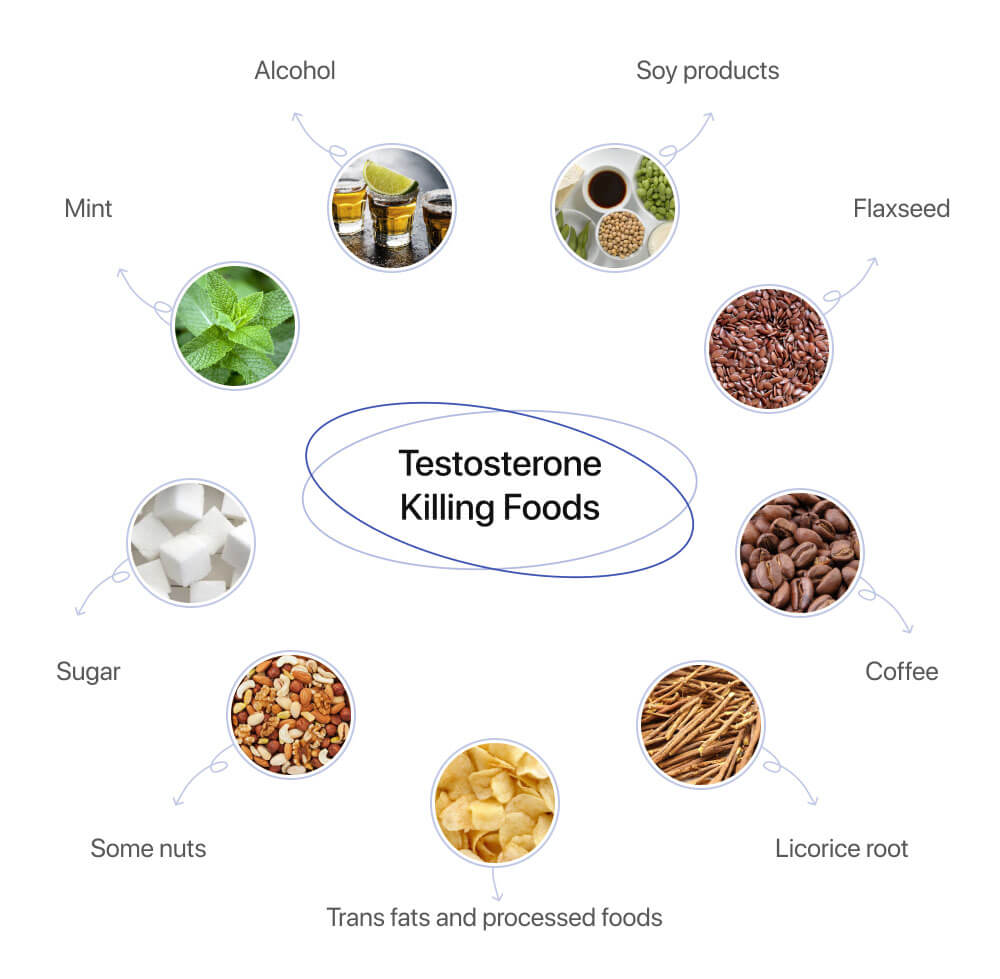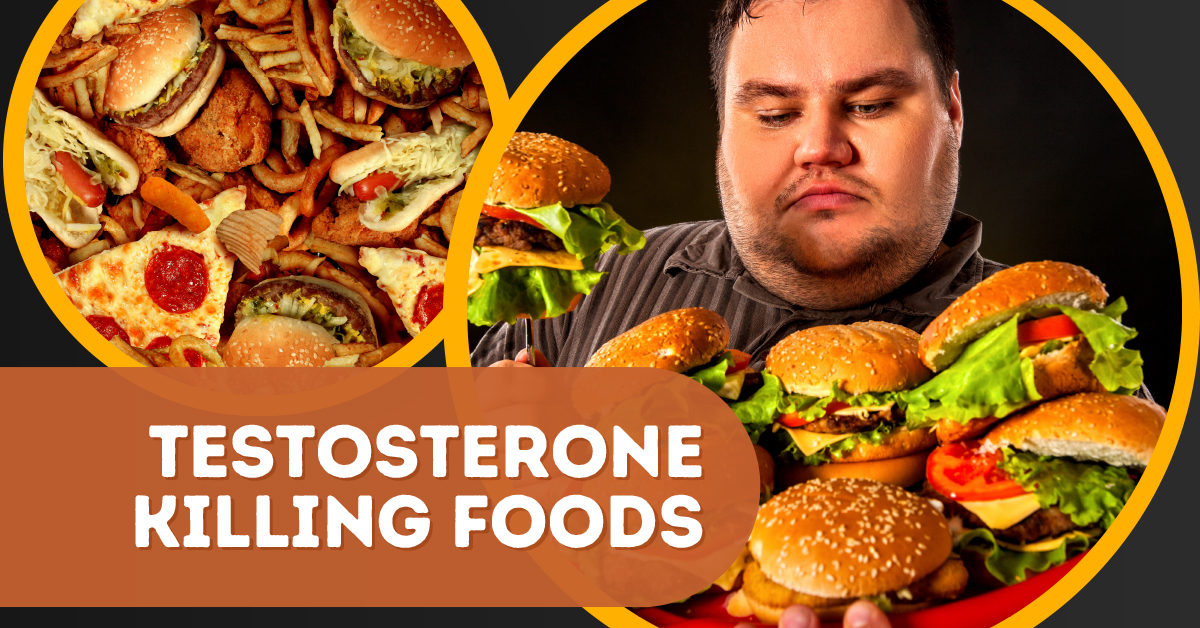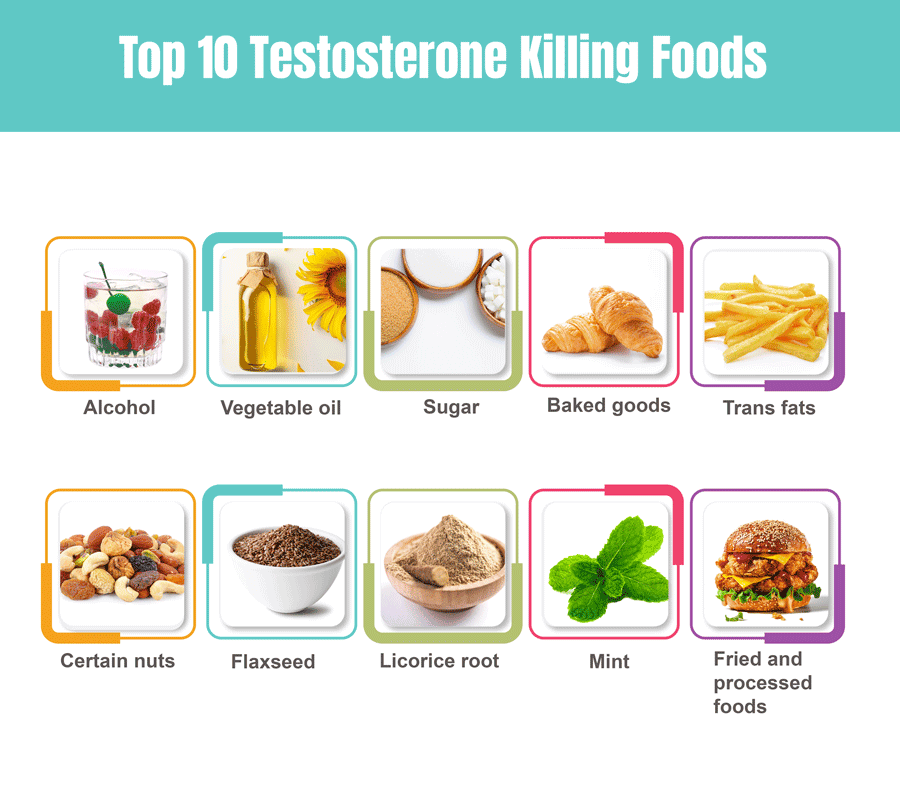Testosterone killing foods – Embarking on an exploration of testosterone-killing foods, this article delves into the fascinating interplay between diet and testosterone levels. Discover the foods that can hinder or enhance your testosterone production, empowering you with knowledge to optimize your hormonal health.
Unveiling the mechanisms behind these dietary influences, we’ll unravel the intricate connections between nutrients, lifestyle factors, and testosterone synthesis. Join us on this journey to unlock the secrets of maintaining optimal testosterone levels through informed dietary choices.
Impact of Dietary Choices on Testosterone Levels

Testosterone, a crucial hormone for men, plays a vital role in various physiological processes, including muscle mass, strength, and libido. While genetics contribute significantly to testosterone levels, dietary choices can also influence its production.
Certain foods have been identified for their potential to increase or decrease testosterone levels. Understanding these dietary influences can help individuals optimize their hormone levels and overall well-being.
Foods that Increase Testosterone Levels
- Zinc-Rich Foods:Zinc is essential for testosterone synthesis. Foods rich in zinc, such as oysters, beef, and pumpkin seeds, can support healthy testosterone levels.
- Cruciferous Vegetables:These vegetables, including broccoli, cauliflower, and Brussels sprouts, contain indole-3-carbinol (I3C), a compound that may enhance testosterone production by blocking the conversion of testosterone to estrogen.
- Healthy Fats:Monounsaturated and polyunsaturated fats, found in foods like avocados, olive oil, and nuts, can promote testosterone production by regulating hormone balance.
Foods that Decrease Testosterone Levels
- Soy Products:Soy contains isoflavones, plant compounds that have estrogen-like effects. Excessive consumption of soy products may suppress testosterone levels.
- Mint:Peppermint and spearmint have been shown to inhibit testosterone production in some studies. However, more research is needed to confirm these findings.
- Licorice Root:This herb contains glycyrrhizin, a compound that can block the production of testosterone by interfering with its synthesis.
Nutritional Components and Testosterone Production

Optimal testosterone production relies on a symphony of essential nutrients working in harmony. Understanding their specific roles empowers us to make informed dietary choices that support healthy testosterone levels.
Macronutrients
The macronutrient trifecta of protein, carbohydrates, and fats provides the building blocks and energy necessary for testosterone synthesis.
- Protein:The primary raw material for testosterone production, protein supplies amino acids, the building blocks of proteins.
- Carbohydrates:Fueling the body’s energy needs, carbohydrates prevent the breakdown of protein for energy, preserving it for testosterone synthesis.
- Fats:Essential for hormone production, fats provide the precursors for testosterone synthesis and regulate hormone levels.
Micronutrients
Micronutrients, though required in smaller quantities, play crucial roles in testosterone production.
- Zinc:Essential for testosterone synthesis, zinc is a cofactor for enzymes involved in the production of testosterone.
- Magnesium:Involved in over 300 enzymatic reactions, magnesium is necessary for testosterone synthesis and hormone regulation.
- Vitamin D:Regulating testosterone production, vitamin D is crucial for maintaining optimal testosterone levels.
- Vitamin B6:Involved in the metabolism of amino acids and testosterone synthesis, vitamin B6 supports testosterone production.
Lifestyle Factors and Testosterone Levels: Testosterone Killing Foods
Lifestyle factors play a crucial role in regulating testosterone production. Understanding the influence of exercise, sleep, and stress on testosterone levels can empower individuals to optimize their lifestyle choices and support healthy testosterone production.
Exercise
Regular exercise, particularly resistance training, has been shown to increase testosterone levels. Resistance training stimulates muscle growth, which in turn triggers the release of testosterone. Incorporating compound exercises like squats, deadlifts, and bench press into an exercise routine can effectively boost testosterone production.
Sleep
Adequate sleep is essential for optimal testosterone production. During sleep, the body releases growth hormone, which stimulates testosterone synthesis. Aim for 7-9 hours of quality sleep each night to support healthy testosterone levels.
Stress
Chronic stress can have a detrimental effect on testosterone levels. When the body is under stress, it releases cortisol, a hormone that can suppress testosterone production. Managing stress through techniques such as meditation, yoga, or spending time in nature can help mitigate its negative impact on testosterone levels.
| Lifestyle Factor | Effect on Testosterone |
|---|---|
| Exercise | Increases testosterone levels |
| Sleep | Supports testosterone production |
| Stress | Suppresses testosterone production |
Food Sources of Testosterone-Boosting Nutrients
Maintaining optimal testosterone levels is crucial for men’s overall health and well-being. Several nutrients play a vital role in testosterone production, and incorporating these nutrients into your diet can help support healthy testosterone levels.
This section provides a comprehensive list of foods rich in nutrients known to support testosterone production, organized into categories based on nutrient content. A table is also included to present the nutrient content and recommended daily intake for each food item.
Zinc
- Oysters
- Beef
- Lamb
- Pumpkin seeds
- Dark chocolate
Magnesium, Testosterone killing foods
- Spinach
- Almonds
- Avocados
- Black beans
- Dark chocolate
Vitamin D
- Fatty fish (salmon, tuna, mackerel)
- Eggs
- Mushrooms
- Fortified milk
Other Nutrients
- Boron: Boron is a trace mineral that has been shown to support testosterone production. Good sources of boron include almonds, walnuts, and avocados.
- D-Aspartic Acid: D-Aspartic acid is an amino acid that is involved in the production of testosterone. It is found in foods such as meat, poultry, and fish.
- Fenugreek: Fenugreek is a herb that has been traditionally used to support testosterone levels. It is available in supplement form or can be added to food.
| Food | Nutrient Content | Recommended Daily Intake |
|---|---|---|
| Oysters (3 ounces) | 18 mg zinc | 11 mg |
| Beef (3 ounces) | 5 mg zinc | 11 mg |
| Lamb (3 ounces) | 4 mg zinc | 11 mg |
| Pumpkin seeds (1 ounce) | 2 mg zinc | 11 mg |
| Dark chocolate (1 ounce) | 1 mg zinc | 11 mg |
| Spinach (1 cup) | 157 mg magnesium | 400-420 mg |
| Almonds (1 ounce) | 80 mg magnesium | 400-420 mg |
| Avocados (1/2 fruit) | 58 mg magnesium | 400-420 mg |
| Black beans (1 cup) | 120 mg magnesium | 400-420 mg |
| Salmon (3 ounces) | 700 IU vitamin D | 600 IU |
| Tuna (3 ounces) | 300 IU vitamin D | 600 IU |
| Mackerel (3 ounces) | 250 IU vitamin D | 600 IU |
Potential Risks and Considerations

While testosterone-boosting foods and supplements can offer potential benefits, it’s crucial to be aware of the associated risks. Consuming excessive amounts or engaging in unsafe practices can lead to negative consequences.
Before making any significant dietary changes, consulting with a healthcare professional is highly recommended. They can assess your individual needs, potential risks, and provide personalized guidance to ensure safe and effective testosterone optimization.
Safe and Responsible Testosterone Supplementation
- Only consider testosterone supplementation under the supervision of a qualified medical professional.
- Follow prescribed dosages and administration instructions carefully.
- Regularly monitor testosterone levels and overall health through blood tests.
- Be aware of potential side effects, such as acne, hair loss, and mood changes.
- Avoid using testosterone supplements if you have a history of prostate cancer or other contraindications.
User Queries
What are the key nutrients essential for testosterone production?
Zinc, magnesium, vitamin D, and certain amino acids are crucial nutrients for testosterone synthesis.
How does stress affect testosterone levels?
Chronic stress can suppress testosterone production by elevating cortisol levels.
Is it safe to consume testosterone-boosting supplements?
Testosterone supplements should only be used under the guidance of a healthcare professional due to potential risks and side effects.